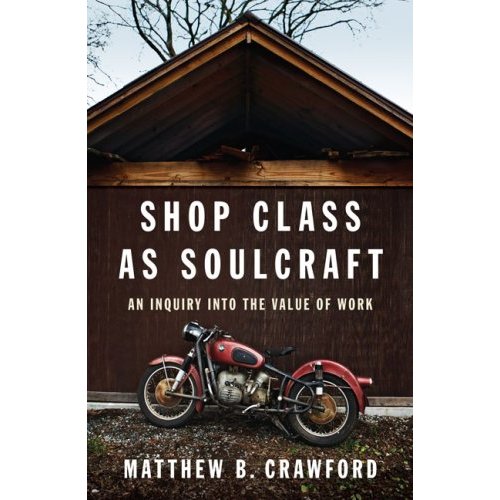
It goes without saying that Matthew Crawford’s Shop Class as Soulcraft is compelling. Discussed on NPR, profiled in The New York Times and The New Yorker, it is attracting attention from academics and the general reading public alike. Much of the work’s appeal stems from the fact that Crawford is dismissive of the effeminacy and core dullness of the modern thinking classes. This polemical element gets at one of the weakest characteristics of modern American existence. As many (Wendell Berry and Christopher Lasch come to mind) have pointed out, this is an existence increasingly hostile to the necessities of the body in favor of the supposed cultivation of the mind.
For instance, instead of buying goods at a local store, we order them online; instead of repairing our possessions, we pay others to fix them, or we replace them outright; instead of building our own goods, we buy them from other nations at cheap and degrading prices; and we work such listless jobs that we need supplemental gym routines to avoid fattening ourselves to death. Throughout Shop Class, Crawford hammers away at our uneasy awareness that we have become pretty useless at doing very basic things we need to do in order to live in a satisfying way. To flourish, to be proud of our selves and our work (indeed Crawford doubts that the “self” and its work are separable), we cannot evade our corporeal existence.
Crawford sees an America increasingly filled with college graduates possessing useless expertise and few useful talents, who nevertheless believe that they must learn to prefer to live this way. This is nowhere truer than among my generation, the so-called “Millennials.” I suspect that he is right about many of us, which is one of the book’s great successes. The exemplar urban Millennial is bilingual (and working on becoming trilingual), sexually promiscuous (and skeptical of marriage), and cosmopolitan; s/he belongs to no place, but is linked to a “community” of like-minded intellectuals with credentials from highly-regarded colleges. S/he has an ironic sense of humor, studiously-cultivated idiosyncratic tastes, and a devoted exercise program. S/he is often environmentally “conscious” in theory, but highly energy-dependent in practice (e.g. gives to Greenpeace each year, but runs an air conditioner all summer). S/he may have some basic competencies with his/her hands, but they are often ironic anachronisms designed to display his/her uniqueness instead of functionally useful skills (i.e. knitting or origami as opposed to farming or motorcycle maintenance). S/he has a laptop. Though s/he has a great deal of stuff, and wholeheartedly depends on it, s/he is not “master” of it.
By means of a battery of personal anecdotes, Crawford convincingly shows that living thus (or nearly thus) pales in comparison with the rich and mindful life of the tradesman. The upshot seems to be that a life spent working with our hands is actually more thoughtful, creative, and intellectually-stimulating than a life spent typing in a non-profit cubicle. He’s right, and this seems to me to be why Shop Class has garnered the attention it has. Millennials are learning to love localism again, albeit in confused ways; they eat locally, but they travel globally and reside nowhere for long. Even if knitting is not as useful as farming, even if it’s a self-conscious projection of an idiosyncratic identity, it is a recognizable response to his/her dissatisfying life “style.” As Millennials notice that they cannot fix their cars, grow their own food, or cook competently, they will look to arguments like Crawford’s for solutions (or an escape?).
It is here that I find Shop Class a bit conflicted. To live a life in tune with the materials which surround us (and upon which we depend), we need local horizons, a point which Crawford sometimes underlines, but usually leaves implicit. The tradesman owes allegiance to the standards implied in his work, not to cosmopolitan universal principles. His materials are those available where he is, not ideal types, hence he makes trips to the local junkyard, not to eBay auctions for a replacement cylinder head. This doesn’t prevent Crawford from building his argument on his work with the internal combustion engine and the various petro-chemicals it needs to remain functional. In other words, the global economic system, with all of its effeminate, pencil-pushing, cubicle monkeys, is a necessary element for any American motorcycle mechanic with a penchant for working on high-end, foreign (not local) machines that require foreign oil to maintain and run. Indeed, his argument for localism and “mastering our stuff” seems very much in tension with several of motorists’ key ideals: easy mobility and freedom from place. What’s more, Crawford leaves any discussion of the increasingly plausible problems of resource scarcity and environmental limits out of Shop Class. Thus, his argument is perfectly tailored for transient Millennial “localists”: so long as they upgrade their knitting to a more muscular, involved hobby (“if only in the summers,” p. 204), they will be well on their way to a more mindful, wakeful life. Crawford’s argument needs the global economy as much as it reviles its outworkings. If this is so, Shop Class may easily be read as a piece of nostalgic, romantic self-improvement literature.
What we have, then, is a forceful argument which underlines much of what seems to be wrong with this Millennial view of things, but which risks being appropriated by the very culture it targets. Even this is not wholly problematic, to Crawford’s credit, but we might still wonder if his critique would be more forceful without celebrating petroleum dependence. Lasch’s and Berry’s works come to mind, as does Tom Springer’s Looking For Hickories. These also celebrate human bodily existence and manual competence, but they maintain that the attendant mindfulness is not necessarily metallic or petroleum-based. This is a fighting localism, beyond individual pride and satisfaction, one with an agenda that is utterly incompatible with the smug irony of cosmopolitanism.
Conor Williams is a graduate student in the PhD program of Georgetown’s Government Department. He is a Teach For America and Bowdoin College alumnus. Conor is originally from Kalamazoo, Michigan, the home of Bell’s Beer, Derek Jeter, Greg Jennings, and Rogaine.





8 comments
Larry Polon
Conor,
Which book of Lasch’s do you recommend on this theme?
Andrés Villanueva
Artie, D.W.,
Does the G in your 50 MPG stands for Gallons of oil/petroleum/gas? If so, it seems like Williams’ point stands. At no point did he claim that motorcycles are equivalent to semi-trucks in terms of petroleum use. I think he’s suggesting that it’s hard to celebrate Crawford’s localism simultaneously with the petro-globalism required by his love of foreign motorcycles. Their relatively lower MPG is irrelevant to Williams’ argument, if I’m reading him right.
Andrés
M. H. Lucero
I myself had many similar thoughts while reading the book, especially concerning the nature of the “need for speed” craze and the necessity of industrialism for cars and motorcycles. So clearly there is an important aspect lacking in this book. However, I think that this is an extremely encouraging trend, and considering the book’s overall sanity it is probably a better book for the modern reader than almost anything out there. It’s at very least a good starting point for someone who’s tired of modern culture.
D.W. Sabin
I’ll take the humming BMW with Artie. Is this review cautioning against an appropriation by the dread “cosmopolitan” or is it forcing a few cosmopolitan hot button issues into what is a very simple and clear exposition?
Not to let up on the pampered “millenials” but they were raised by my fellow Boomers, the most narcissistic and gullible pilgrims to walk God’s Green Earth since Rousseau shambled around in his peed pants, pontificating about the Noble Savage in Paris Salons.
Artie
“…but we might still wonder if his critique would be more forceful without celebrating petroleum dependence.”
I don’t hear celebration of petroleum dependence in Crawford’s book. Even old BMWs can get in the neighborhood of 50 mpg or more if well maintained, the kind of mileage associated with exotic, computer-controlled hybrid cars. If I had to choose, I believe the more responsible choice would be to descend the bumpy slope of petroleum depletion on a used motorcycle than a new computer dependent hybrid.
ender01
This is the first discussion of Crawford’s book I’ve seen that touches upon millenials and our ineptitude in so many areas. Ugh. Your description rings close to home and describes many of my classmates.
Comments are closed.